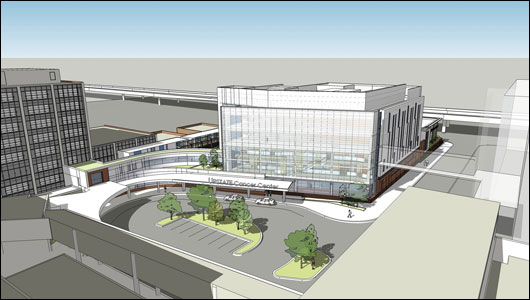Upstate to break ground on new cancer center next year

The five-story $74-million facility that will bring all of the university's outpatient cancer services—pediatric and adult—under one roof.
SYRACUSE, N.Y. — Upstate Medical University will break ground early next year on the Upstate Cancer Center, a five-story $74-million facility that will bring all of the university's outpatient cancer services—pediatric and adult—under one roof. The center is expected to open in September 2013.
The new facility will encompass 90,000 square feet on three stories and feature 27 private infusion areas, four-season rooftop healing gardens, meditation room, family resource center, multidisciplinary practice locations, private space for genetic, financial and other counseling services, a boutique for patient apparel and other personal products and three linear accelerator rooms. The facility will include two additional floors to accommodate future expansion.
"Cancer has emerged as one of Upstate's key areas of influence, whether it is cancer research or cancer care and treatment," said David R. Smith, president of Upstate Medical University. "With this new facility, Upstate takes a significant leap forward to strengthen and enhance an already top-flight cancer program. Just as we did with the Upstate Golisano Children's Hospital and the new adult floors in our East Tower, Upstate looks forward to providing the region with a new standard of cancer care."
The Upstate Cancer Center will be located on the site west of Upstate University Hospital that currently houses the University's Regional Oncology Center (ROC) and a parking lot. The facility will wrap around the ROC, incorporate the Gamma Knife Center and connect to the hospital's west wing.
The cost of construction for the facility is $50 million, with an additional $24 million in medical equipment and furnishings, bringing the total cost of the facility to $74 million. About $50 million of the project will be paid by Upstate's capital expansion and renovation program, including the issuance of bonds that will be repaid with interest from revenues generated by the Upstate Cancer Center, and a public fundraising campaign that seeks to raise $15 million.
Called "Give Hope a New Home," the campaign will support construction of the extra patient amenities ($10 million) incorporated in the design and fund programmatic endowments ($5 million) in adult medical oncology, children's oncology, surgical oncology, brain tumors, breast cancer and the Upstate Cancer Research. The public launch of the campaign will be announced at the Upstate Gala Dec. 4.
Upstate University Hospital Chief Executive Officer John McCabe, M.D., said the distinctive features of the Upstate Cancer Center will be its comforting and calming surroundings in which to deliver treatment for patients of all ages. "The same patient and family-center care philosophy that guided us in the construction of the East Tower will guide us in this undertaking," McCabe said. "This will be a distinctive facility, treating cancer patients of all ages in a calming and comforting setting that will be uplifting for patients, their families and those who care for them."
A main focus of the cancer center will be the ability to house all of Upstate's cancer services in one location, including the Dr. William J. Waters Center for Children's Cancer and Blood Disorders, which is currently located in Upstate University Hospital. The center treats more than 700 children from a 30-county region, including Pennsylvania.
"Patients will be able to see all their cancer specialists, including counselors and financial advisors in a single location no matter when they receive their care," McCabe said. "This will enable us to deliver our care in a more efficient and effective manner."
The new center will also enable Upstate to meet the growing demand for cancer services.
The number individuals receiving outpatient cancer treatment at Upstate has nearly doubled in the last ten years, from 8,501 in 1999 to 16,221 in 2009. The number of visits to Upstate's outpatient adult infusion service have increased from 14,778 in 2005 to 18,245 in 2009, and the number of procedures performed at the ROC has increased from 16,038 in 2005 to 29,253 in 2009, reflecting not only the growth in patients and visits, but the complexity of care provided.
Upstate officials say the new center will likely attract additional cancer specialists to the region that will strengthen an already strong cancer program. Last year, Upstate's cancer program received a three-year accreditation with commendation from the American College of Surgeons' (ACOS) Commission on Cancer. It is the only cancer program in the Syracuse region that has been accredited by the ACOS for the past nine years. Other 2009 honors include re-accreditation of Upstate's bone marrow transplant and radiation oncology services and a first-time accreditation for its breast program.
The Upstate Cancer Center will work closely with the Upstate Cancer Research Institute, which opened in June. Often, cancer research requires a strong partnership between scientists and medical doctors, who can facilitate new cancer cures and diagnostics from the bench to the bedside. Additionally scientists and physicians work closely on offering Upstate's cancer patients access to some 150 new treatment protocols through clinical trials.
Upstate provides treatment for all forms of cancer, including blood, bone, brain, colon, endocrine, genitourinary, gynecologic, liver, bladder, pancreas, lung, chest, prostate, thyroid, and cancers and blood disorders associated mostly with children, including leukemia, brain and bone tumors and sickle cell anemia.
The architect for the building is EwingCole, with offices in Philadephia, Washington, D.C., and Irvine, Calif. The building will be designed, built and operated in an environmentally and socially responsible fashion, enabling Upstate to pursue a Silver Rating under the United States Green Building Council's Leadership in Energy and Environmental Design (LEED) rating system.
